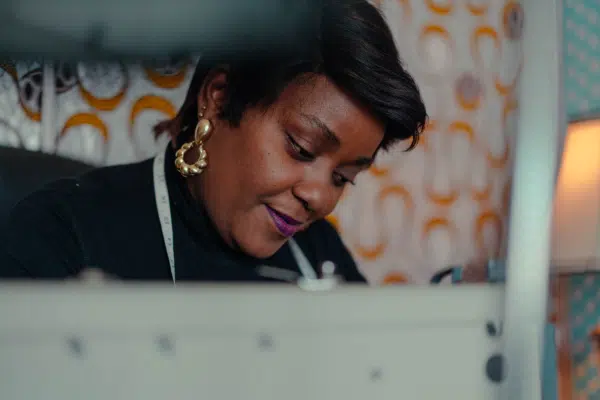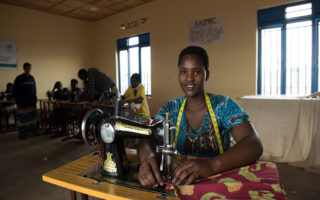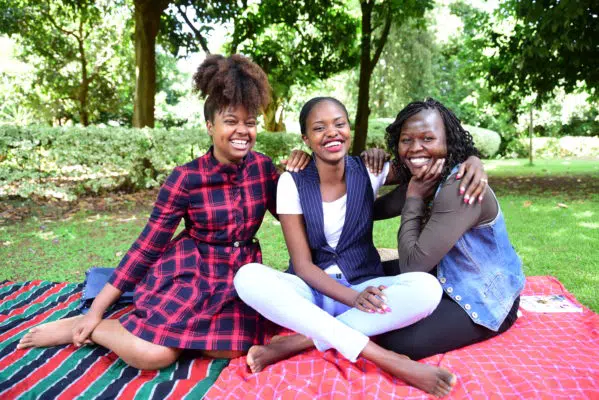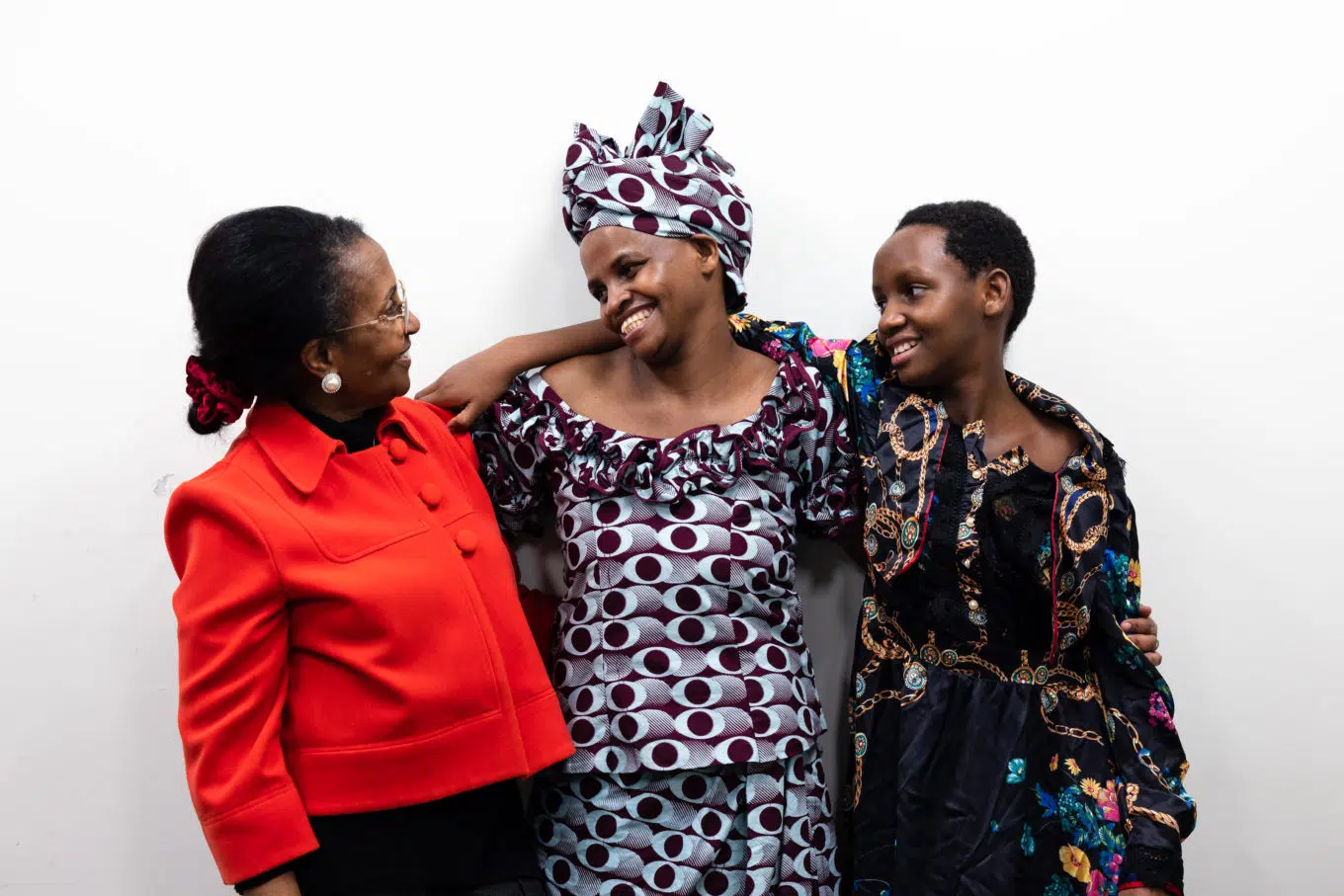
Saba Andu (left) helps reunite Josephine Niyibinga and her daughter Evodia (middle to right) three and half years later. © UNHCR/Amy Thorp
Resilience and kindness pave the path to reunification
By Hawa Amin-Arsala
Josephine Niyibinga is sitting in the office of the Saskatoon Open Door Society (SODS) on a Wednesday morning, a place she has frequented many times throughout her few years working with them on reuniting with her eldest daughter, Evodia.
After fleeing Burundi and landing in camps in Tanzania, they now sit together, three and a half years later, in layers of puffer coats and blue medical masks that can’t contain the cheek-numbing grins underneath. We speak through a translator, though our gestures transcend language over the Zoom screen.
Josephine apologizes to Saba Andu, one of SODS’ counsellors, for her display of passion in attempting to reunite with Evodia since she landed in Canada in April 2018. Saba smiles and gently lets the concern melt away—she has spent 33 years working with refugees, and there are no offences taken.
“It is my honour to serve,” Saba says.
Saba herself is a refugee from Eritrea and draws on a wealth of knowledge and first-hand experience. In her work with Josephine and Evodia, she serves as the SODS counsellor, helping with employment placement, daycare, language services and, most importantly, the reunification of refugee families.
The nostalgia and nightmare of Burundi
While Burundi has faced deep ethnic and political conflict over the years, Josephine reminisces about a peaceful life on her farm.
“In Burundi, you can own your own farm. I was a farmer and spent my time going to church,” she recalls.
She thinks fondly of the advice her mother gave her growing up.
“She taught me to be a good person, to live nicely with people and not to be selfish,” Josephine says. “You never know what could happen tomorrow.”
It was a fateful turn of events after the birth of her fourth child, that would test her mother’s prophetic guidance. Her son was born with albinism, shifting Josephine’s relationship to her community and even her own family.
In several African countries, including Burundi, Albino people, particularly children, are often hunted, abducted, and murdered in ritualistic killings.
“There was no way I could do that to my own son.”
There have been hundreds of cases of attacks and killings of persons with albinism reported in 28 countries in Sub-Saharan Africa in the past decade, according to the United Nations.
Through misguided lore, their body parts are seen as talismans that bring abundance and prosperity.
“My husband thought we could be rich, my whole family said that we would have success and fortune because he was born albino,” Josephine adds.
Josephine’s husband was intent on selling their son, but for Josephine “there was no way I could do that to my own son.”
She ran away the night a man was to come to the house and take her child. That night she slept in the forest and began the arduous trek to neighbouring Tanzania with three of her children. Evodia was left with her grandmother for security reasons.
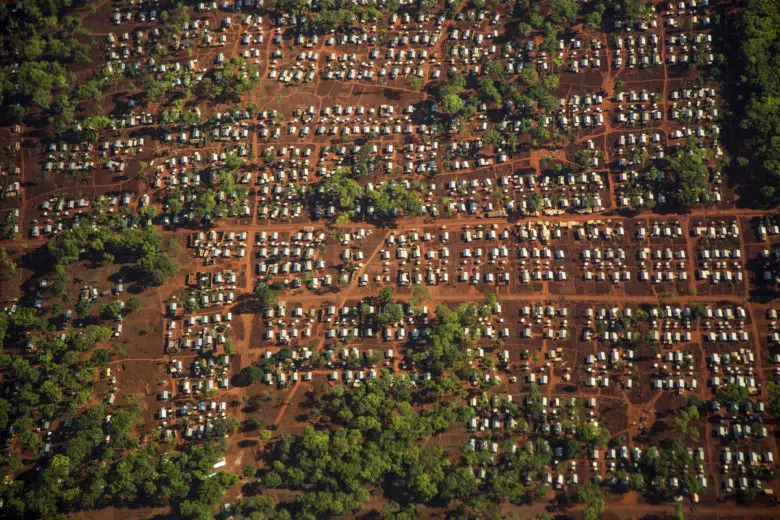
Aerial of Mtendeli refugee camp in western Tanzania. © UNHCR/Georgina Goodwin
In early September 2016, Josephine and her three children reached the Mtendeli Camp in Tanzania. However, their hopes of finding safety there were soon dashed as Josephine’s albino son became the target of the same superstitions and prejudices that drove them from their home in Burundi.
Concerned about the family’s safety, UNHCR officials in Tanzania worked feverishly with officials at the Canadian embassy in Dar es Salaam to resettle Josephine and her three children in Canada, one of the few countries in the world that accepts particularly vulnerable refugees for resettlement.
Filling the separation with wisdom
However, by the time Evodia finally made it to the camps in Tanzania, Josephine had already been resettled.
“Life was not easy without parents in the camp,” Evodia says.
Over rare opportunities to video chat, Josephine was able to pass on the same wisdom that her mother shared with her: “I told her to be a good daughter and be nice with your community.”
A mother bereft, Josephine worked with SODS through the mountains of paperwork over the years and unfruitful attempts to locate her daughter through the tangle of communication and host families.
It took a year to get a polaroid of Evodia for paperwork, and with the help of the UNHCR, she underwent the prerequisite medical exams in Dar es Salaam. The simplest of administrative tasks required colossal efforts by a network of people on Evodia’s case.
As Saba continued to console Josephine and preach patience, Josephine remarks: “It all felt like a story that my daughter would come. I didn’t believe it could happen.”
Reunited again
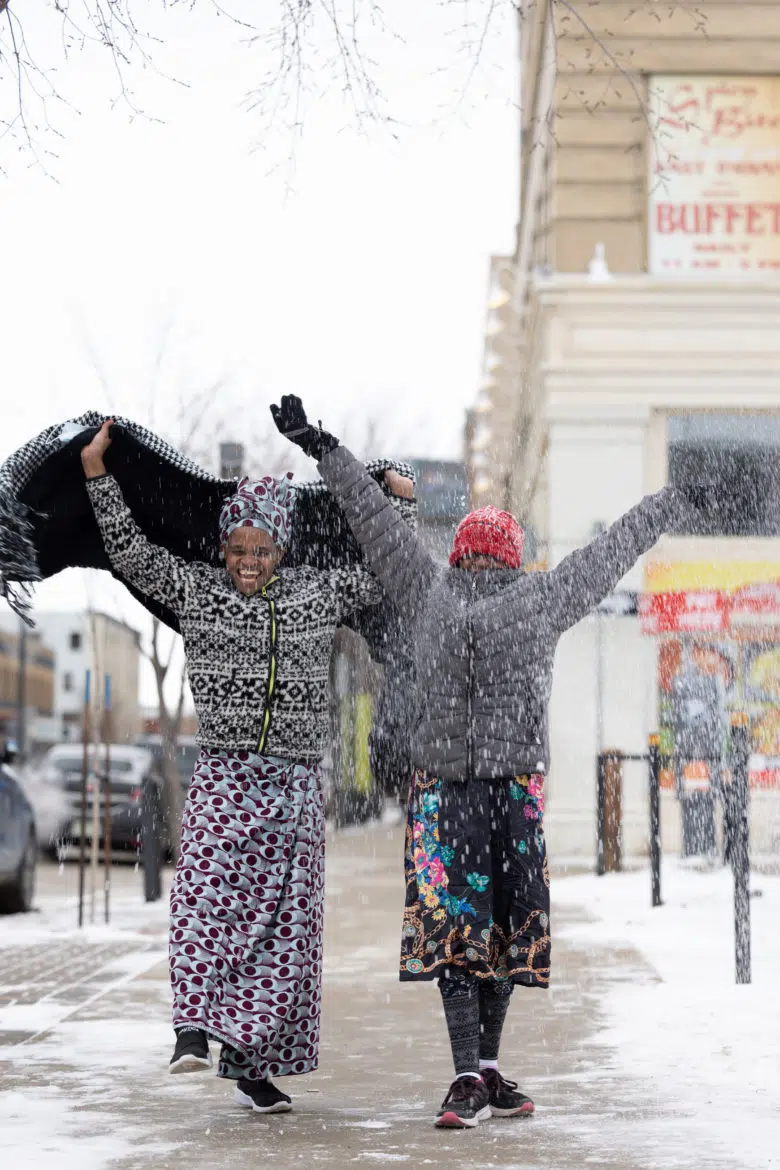
Josephine and Evodia experience Saskatoon snowfall together. © UNHCR/Amy Thorp
When the time finally came on September 9, 2021, Josephine had to meet her daughter at Pearson International Airport in Toronto.
“I was ecstatic to see her. I can’t explain the feeling,” Josephine says smiling.
Evodia, now 11 years old, greeted her mother taller and with a wisdom that far surpasses her age. She is now enrolled in school and enjoys the fact that all the classes are in one building.
“Back home the classes are all far apart from each other….. I am so happy that the teachers are friendly here and I appreciate their help!”
She has also come to favour hamburgers, though her mother’s cooking is what she missed the most.
Keeping their culture alive in Canada is of utmost importance to Josephine.
“I want to speak our language, tell the stories of our people and remind my children to keep their culture,” she says.
In Saskatoon, dubbed the city of bridges, Josephine is part of a friendly community that both respects her culture while offering support in immersing into their municipality.
Sanctuary in Saskatoon
When Josephine closes her eyes to remember the day she first came to Canada, she recalls having a headache and not feeling well. As soon as she arrived, she received help at every turn.
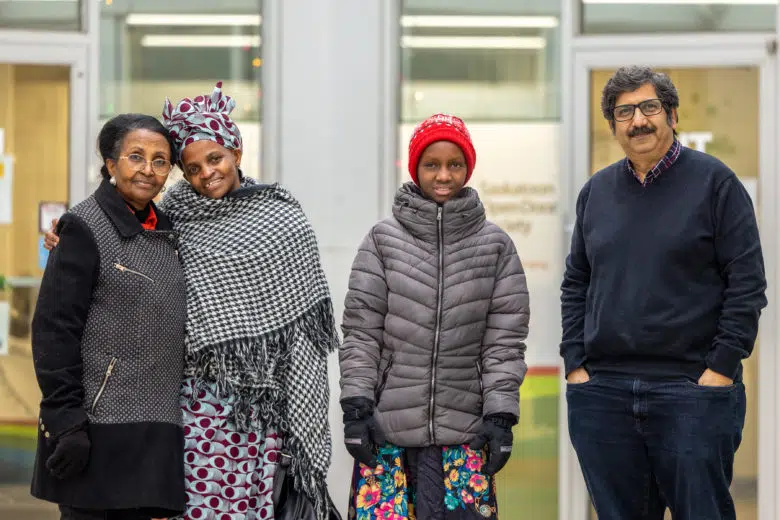
Saba Andu, Josephine Niyibinga, Evodia and Ashfaque Ahmed, Director of the Settlement and Family Services (left to right) pose for a group photo. © UNHCR/Amy Thorp
Offers of water and medicine; friendly hellos by the neighbours and grocers who offered to teach her English reassured Josephine that she could find a home in the tall grass prairies of Canada. Her mother’s guidance, tucked intently in her heart, met its fruition.
“I wish I knew the language more. I want to explain what I have in me. I wish I could express the appreciation in my heart. I am so happy I wish I could explain it,” she beams.
While her language skills and family grow, Josephine’s body language speaks volumes. Beneath the layers of separation and longing, she has found peace and a new life in an amicable city.
Indeed, community is a central aspect of what Josephine hopes to cultivate as a new resident in Saskatoon. It is her dream to stay here with family and contribute to the community. As a family of seven now, she envisions a humble life that is in harmony with her neighbours.
Evodia wraps her arms around her mother before they take leave from the office. Holding mom closely, a thumbs up in one little hand. They giggle as they zip up their jackets and a chorus of thank yous and praises to God ensue in three languages.
This story was produced by UPPL. Hawa Amin-Arsala is an interdisciplinary writer, researcher and artist.



